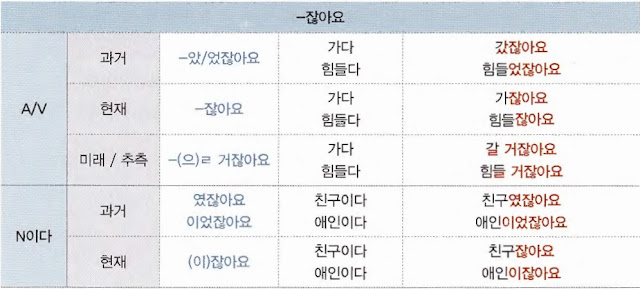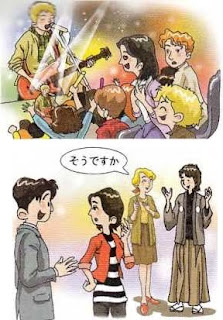가: 저 가수를 왜 좋아해요?
Why do you like that singer?
나: 노래도 잘하고 멋있잖아요.
He sings well and (as you know) is good-looking, too.
가: 카일리 씨가 일본어를 정말 잘하네요!
Kylie is really good at Japanese.
나: 카일리 씨는 일본에서 공부했잖아요. 지난번에 카일리 씨가 말했는데 생각 안 나요?
(As you know) Kylie studied in Japan. Don’t you remember she told us that the last time we saw her?
1. This expression is used when the speaker wants to state a reason that the listener should also be aware of or when the speaker wants to remind the listener of a reason that he or she has apparently forgotten. It is used only in conversation and not in written Korean. Also, it is not used in formal speaking situations.
 가: 이번에도 양강 씨가 1등을 했네요!
가: 이번에도 양강 씨가 1등을 했네요!
Yang Gang got 1st place again this time!
나: 양강 씨는 항상 열심히 공부하잖아요.
(As you know) Yang Gang always studies hard.
가: 네, 맞아요. 양강 씨는 언제나 열심히 공부하지요.
You’re right. Yang Gang studies hard all the time.
가: 수진 씨가 언제 고향으로 돌아가지요?
When we” Sujin go back to her hometown?
나: 지난주 토요일에 돌아갔잖아요.
(You might recall that) she went back last Saturday.
가: 아, 맞아요. 수진 씨 배웅하러 공항에도 같이 갔었지요?
Oh, you’re right. We went to the airport together to see her off, right?
가: 세영 씨가 집에 온다고 해서 복숭아를 좀 샀어요.
I bought some peaches because Seyeong said she was coming by the house,
나: 여보, 그 친구는 복숭아 알레르기가 있잖아.
Dear, (perhaps you’ve forgotten that) she’s allergic to peaches.
가: 아, 그랬죠? 깜빡했네요.
Oh, is that so? I totally forgot.
2. This expression can also be used to scold or rebuke the listener for not heeding the speaker’s advice or for allowing something bad to happen even after being warned about it. In such cases, this expression is often used together with a statement indicating what was previously said or advised.
가: 엄마, 어떻게 해요? 학교에 늦겠어요.
Mom, what should I do? I’m going to be late for school.
나: 그래서 어제 일찍 자라고 했잖아.
Now (you should know) that’s why I told you to go to bed early last night.
가: 그 남자가 알고 보니 정말 나쁜 사람이 었어요.
Once I got to know him, I realized that guy was really a bad apple.
나: 그거 봐요, 내가 뭐라고 했어요. 그 사람 나쁜 사람 같다고 했잖아요.
Look, now what did I tell you? (Didn’t I say that) he seemed like a bad person.
>> You can click on the title of each grammar below to learn the other grammars that also expresses ‘Reasons’:
01. -거든요
02. -잖아요
03. -느라고
04. -는 바람에
05. -(으)ㄴ/는 탓에
06. -고 해서
07. -(으)ㄹ까 봐
>> Full of Intermediate grammar: Click here

